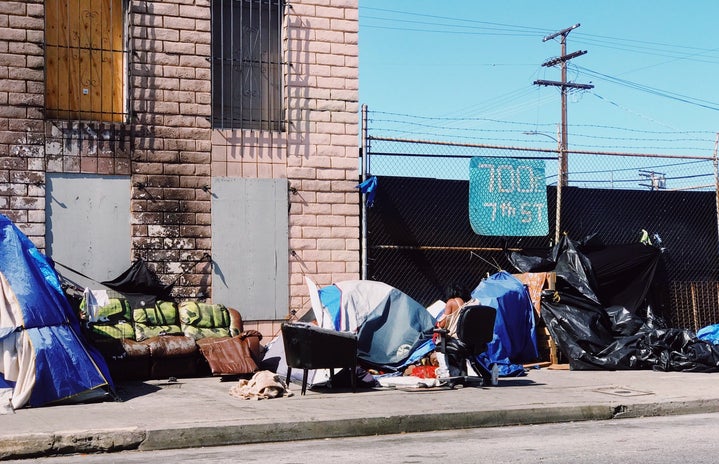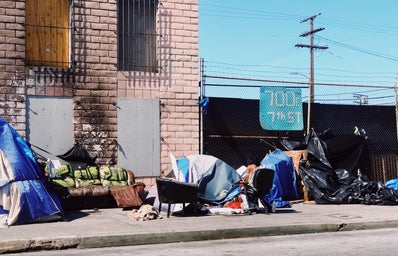It’s January 8th, 1964. President Lyndon B. Johnson is giving his State of the Union address. All eyes are on him as he makes one of the most radical–yet necessary–announcements: the United States is declaring a War on Poverty.
This announcement came at a time of great disparity in the U.S.: racial discrimination was rising to its height during the Civil Rights Movement, and the poverty rate grew dangerously high, at 14.7% in 1964. Situated in the context of the space race and the moon landing, this was a time of great prosperity, but one that Johnson recognized as not reaching everyone and in fact, leaving far too many Americans behind.
The speech, linked above, is an inspiring one, but more than that, it rings with applicability for today. While in 2018, the national poverty rate was 11.8%–less than it was in 1964–that’s 11.8% of 38.1 million people–4,495,800 people struggling in poverty. We remain a wealthy nation with a GDP of $20.54 trillion as of 2018, but one with a horrific wealth gap. After the recession, only the top 20% were really able to recover, which means that 80% of the country was left behind and continues to struggle to recover.
Indulge me in a little exercise, and consider your net worth. What is the combined total of your checking, savings, and cash? Any extra assets? Maybe you’re well-off, maybe you’re comfortable, or maybe you have to carefully and strategically budget and allocate every penny. How much of your life is spent working just so you can afford to live?
Now, consider the fact that there are 540 billionaires in the United States, as of 2016. The top three wealthiest Americans include Jeff Bezos (surprise, surprise) at $114 billion, Bill Gates at $106 billion, and Warren Buffet at $80.8 billion. I have difficulty attempting to visualize what $5 million looks like, let alone $114 billion. While far from an academic source, this quick article offers an easy breakdown of the money and what trying to spend it in a lifetime looks like:
“So, let’s see how difficult it would be to spend one billion dollars in the next 25 years of your life. For starters you would have to spend 40 million dollars each and every year. That would mean spending over 3 million dollars each month. Breaking it down even farther, it means you would have to spend over $100,000 every day for the next 25 years in order to spend one billion dollars.”
This is the math for how to accomplish spending $1 billion. It is not a big leap, then, to assume that spending, say, $114 billion in a lifetime is comically impossible. Then, of course, I find myself frustrated that an unspendable amount of wealth is being kept away from the nearly 5 million Americans in poverty who desperately need it, and who need it now.It’s 2020, and we can see that clearly LBJ’s vision for America has largely failed. But does that mean we should give up the dream?
I offer the reasonable answer: no. Hell no. LBJ put it bluntly in his speech: “The richest nation on earth can afford to win [the war on poverty]. We cannot afford to lose it.” When people are in poverty, practically everything is compromised, and when necessities are compromised, people get hurt (I’m looking at you, healthcare system). Extending part of the Great Society, a new legislative reform at the time, he claims, “Poverty is a national problem requiring improved national organization and support,” continuing on to say that it must also occur at the state and local levels. In short, we need a full-body effort to reshape our society, because we are too wealthy to allow so much wealth-related suffering.
Why am I bringing this up now? Well, to begin, COVID is–and you’ll have to excuse my language–fucking the economy. Small businesses and non-essential workers are struggling with the economic halt and unemployment, government provisions to help sustain businesses have been unclearly allocated, and the funds have already been used up. Larger food chains like Shake Shack tried to get away with taking funds (in the millions) that were intended for small businesses, those with 15 or fewer employees. (Thankfully, they were discovered and made to pay it all back, but nevertheless, it’s troubling that they were able to do that in the first place. It makes me question the competency of these people managing trillions of dollars that could determine whether we crash and burn or simply stumble.) With the inability to make money, and government stimulus checks being far from sufficient, many will see incredible financial hardship once everything kicks into gear again. I won’t be surprised to see the poverty rate in the U.S. rise tragically.
My second point of motivation stems from the fact that I live in Seattle, on the cusp of the International District. Across the Yesler bridge is a homeless encampment that, only a year ago, was across the street from my residence. I see people who are mentally ill, who look like all they’d like is a shower and a hot meal, who struggle to create dignity for themselves despite their conditions. I have watched both encampments grow to an enormous size–which is incredibly dangerous during a time of mandated social distancing, and the toxic (and usually unsanitary) drug environment that is directly related to much of Seattle’s homelessness.
Jeff Bezos can hide away in his $165 million home in L.A. because he can afford to. I’m a slightly upper middle class young woman who can barely afford to live in a decent neighborhood that’s close enough to my university so I can attend classes. I can’t afford ignorance, and so I have to see the consequences of wealth inequality. I witness and maneuver my way through a city ravaged by the ripples of greed. All of this was here before COVID struck, but since the stay-at-home order has been put in place, the majority of people I see around the city on my occasional walks are homeless people. Why? Because they don’t have a home to shelter in place. I wonder what LBJ would say about the state of our nation today.
President Nixon announced the War on Drugs in 1971. It shifted our focal point from poverty to drugs, and frustratingly did not even do an effective job at interfering with the flow of illegal substances moving in and out of the country. It is at best thinly veiled racism intended to benefit the government and excuse radicalization of police forces. I’m furious over the amount of money wasted on this “war” that could have been utilized to fight the War on Poverty, the war we never finished, the war that hurts the majority of Americans.
I want to bring back the War on Poverty. And for the first attack, I want us to institute a Universal Basic Income.
If you aren’t familiar with what a UBI is, what it does, or how it could be beneficial, I suggest you pause and watch this. Imagine, for a moment, if we had a UBI before COVID struck. Consider the lack of stress around being able to pay for your home, how much less negatively impactful the drop in employment would be. Instead of the surge of rent strikes happening around the city, there wouldn’t be such opposition between renters and landlords (because let us not forget that being a landlord is their source of income).
I have seen so much back and forth between people all knee-deep in this issue, and I am frustrated because none of us are the problem. Not really, anyways. The problem is those who are in charge. Unfortunately, our country is under the command of a man who suggested we inject bleach if we were sick (I still cannot believe this is real). We’ve been under the command of a country that wants to help those who are so far beyond even needing help while happily neglecting, ignoring, and punishing those who sometimes need to make a choice between food and making rent. We are fighting over scraps while they dine on lobster at the dinner table, and we’re all too starving to stop and question who the bad guy is.
I’ve said a lot, so I’ll end this on these final notes.
Firstly, let us separate church and state and dismantle the idea that socialism is “godless.” To be clear, capitalism breeds the wealthy to believe they are gods and thus encourages individualism; socialism positions us with a more community-based focus. Capitalism has some benefits, but I think it’s time we consider what a combination of the two would look like. Let’s structure a society where basic needs–shelter, food, clothes, education–are never in question, while also having a space for competitive markets. The idea is that we can engage in financial competition with the sky as the limit, but no one has to sink into the dirt in the process.
Secondly, it would be worthwhile to shift our bottom line from profit to people. Shortcuts are taken when our priority is profit. Pain, injury, death, risk–all of those stop being moral questions and instead become budget questions, and slowly we lose our ability to see our common humanity in others. It is also focused on fast profit (think shortcuts, compromised quality, planned obsolescence), and I say that because if our bottom line was people, there would still be incredible money to be made, but money in the long run. Putting people first tends to result in things that are sustainable because they emphasize the well-being of people and create–to whatever degree–a kind of user loyalty.
Finally, please, let us all continue to take COVID and self-quarantining seriously. The more we do our part, the faster this ends and we can begin the journey of rebuilding what has crumbled. And when the time comes to rebuild ourselves, remember the decisions that were made, where people’s values were when times were tough, and build with the understanding that something like this may strike again.


